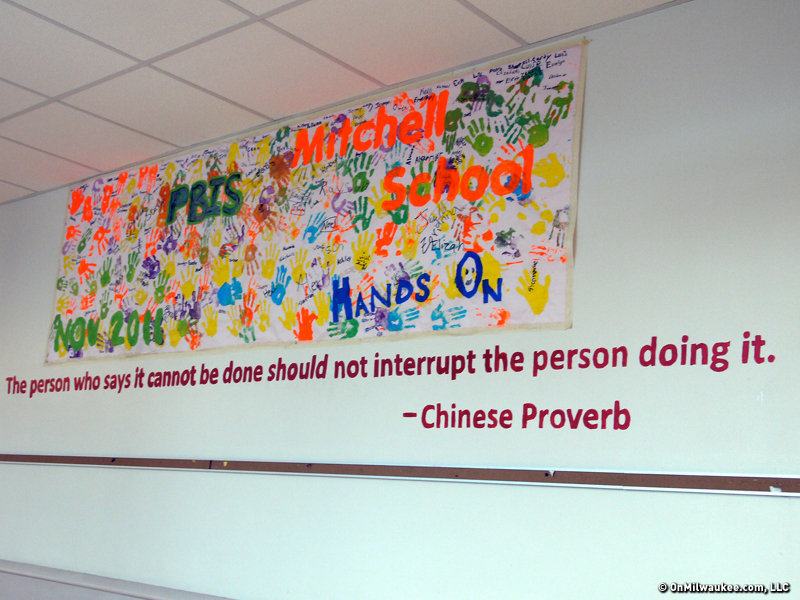The idea of donating to public schools has raised questions over the years. Should a tax-funded system raise extra money from the private sector? And, the related and extremely relevant companion: should it HAVE to?
Then there’s the question of individual public schools seeking outside funds – grants, donations, fundraising events, kids selling candy bars – for specific programming.
Like many discussions surrounding schools, these can be complicated questions and the subject was addressed just this weekend in The New York Times Magazine, when a reader wrote to Kwame Anthony Appiah’s "The Ethicist" saying (s)he felt immense pressure to donate to a granddaughter’s public school.
"Is this level of pressure for large contributions to the operation of a public school unethical," the reader queried.
"All children deserve a fair shot at a decent education, let’s agree," Appiah replied in a long answer that I won’t quote in its entirety here. "Are inequalities among schools that aren’t a result of unequal government provision a threat to this ideal? Only if inequalities between private and public schools are. So it would be wrong for parents’ groups to bolster a public school by providing resources beyond what’s available to all children in the system only if it were also wrong to send children to private schools.
"Even affluent public schools have fewer resources than many private schools. Raising money from parents and other outside donors allows them to do a better job than they otherwise would, resulting in better educations for some children in the public system than for others. ... But inevitably, we confront a trade-off between increasing fairness and increasing the number of people who get a worthwhile good; in this case, a better education.
"Which returns us to the point with which I started. Certain values vary with roles: We expect an umpire to be a neutral party on the playing field, while Mom and Dad take a rooting interest in their kid. Government officials ought to be concerned with fairness and impartiality; it’s right, and inevitable, that parents, and parents’ associations, want to do the best they can for their children."
This is a very long-winded way for me to cheer the latest reboot of the MPS Foundation, which emerged last week and which gets an official airing today when the foundation – which since 1998 has raised funds, beyond taxes, from the community in support of Milwaukee Public Schools – hosts its annual meeting at the Riverside Theater Downtown from 4:30 to 7 p.m.
The foundation is a chance for everyone, from individuals to businesses and grant-generating groups, to lend a hand to schools in need.
While some business groups here have appeared to make the privatization of MPS its goal – including lobbying hard in Madison to break up the district, change its governance and/or remove voters as oversight of the school board – others in the business community have opted to get on board and help make positive change in the district’s more than 150 schools.
"We see the opportunity to support those offerings that inspire young people to learn and go beyond the basics that are suffering budget cuts," said Zilber’s John Kersey, chairman of the Foundation’s board of the directors, and a graduate of John Marshall High School (now Morse Marshall)
"Many of us are proud graduates of MPS who believe in our public schools and our young people. The future of our community depends on the success of MPS – we are committed to showing students, teachers and administrators that we care and are here to help. Our diverse group is made up of community leaders from many sectors with one goal – support MPS teachers, staff and most of all, its students."
To that end, the foundation board has named a few focus areas in a statement released last week.
The arts
"The goal of the MPS Arts Expansion Plan is to continue to provide high- quality arts education, both in and out of the classroom. MPS students improve performance and increase engagement, both academically and socially, through the arts. Teachers and principals attest to how the arts contribute to a positive school climate and improved student behavior. The district has made strong investments and has shown a commitment to arts education by increasing funding in the past several years. MPS was recently selected as one of the new school districts to participate in the President’s Committee on the Arts and the Humanities initiative, Turnaround Arts. Turnaround Arts infuses high-need schools with the arts as strategy to help close the achievement gap and provide equitable access to arts education. Funding will support the district’s Turnaround Arts programming."
Universal driver education
"Working to level the playing field for our students, MPS has lead efforts to develop the Universal Driver Education (UDE) program which makes driver education accessible to any MPS student between the ages of 15 ½ and 17 ¾. Through UDE, students are able to complete their classroom instruction and behind-the-wheel training. It eliminates the barriers that could potentially prevent a young person from obtaining a driver’s license and works to close the gap between Milwaukee youth and their suburban counterparts."
MPS Learning Journeys
"Learning Journeys are high quality educational events provided at no cost to all MPS students in six different grade levels. In the 2015-2016 school year, the Learning Journeys program served nearly 25,000 students in collaboration with seven community partners. Each Learning Journey is designed by MPS subject area experts in collaboration with community partners. The goal of the program is to connect children to their communities through formative experiences and to support and enhance classroom instruction with hands-on activities."
Scholarships
"The MPS Foundation offers a number of scholarships to assist MPS graduates as they pursue their college degrees. Support for scholarships come from a variety of sources, including the MPS Proud scholarship, funded entirely by MPS teachers, administrators, and school staff. In 2016, 11 students were awarded with nearly $40,000 in scholarship funds."
Innovation
"The most exciting ideas start in our classrooms, so the MPS Foundation provides opportunities for teachers (via mini-grants and other classroom-focused funding) to bring fresh perspectives and new research based teaching methods into the classroom."
"The opportunities that will be created by the reconstitution of the MPS Foundation will benefit our students and staff tremendously," said MPS Superintendent Dr. Darienne Driver. "I’m looking forward to partnering with this diverse, influential group of Milwaukee leaders for the advancement of the Milwaukee Public Schools."
At the moment the MPS Foundation board includes a variety of influential Milwaukeeans, including Bucks President Peter Feigin, Mueller Communications’ H. Carl Mueller, Hispanic Professionals of Greater Milwaukee President and CEO Griselda Aldrete, SysLogic CEO Tina Chang, Milwaukee Office of Violence Prevention Director Reggie Moore and others.
But Kersey said, not all funds are expected to come from the powerful and the 1 percent.
"We encourage gifts," he said, "no amount is too small. And every penny will be put to good use."
Born in Brooklyn, N.Y., where he lived until he was 17, Bobby received his BA-Mass Communications from UWM in 1989 and has lived in Walker's Point, Bay View, Enderis Park, South Milwaukee and on the East Side.
He has published three non-fiction books in Italy – including one about an event in Milwaukee history, which was published in the U.S. in autumn 2010. Four more books, all about Milwaukee, have been published by The History Press.
With his most recent band, The Yell Leaders, Bobby released four LPs and had a songs featured in episodes of TV's "Party of Five" and "Dawson's Creek," and films in Japan, South America and the U.S. The Yell Leaders were named the best unsigned band in their region by VH-1 as part of its Rock Across America 1998 Tour. Most recently, the band contributed tracks to a UK vinyl/CD tribute to the Redskins and collaborated on a track with Italian novelist Enrico Remmert.
He's produced three installments of the "OMCD" series of local music compilations for OnMilwaukee.com and in 2007 produced a CD of Italian music and poetry.
In 2005, he was awarded the City of Asti's (Italy) Journalism Prize for his work focusing on that area. He has also won awards from the Milwaukee Press Club.
He has be heard on 88Nine Radio Milwaukee talking about his "Urban Spelunking" series of stories, in that station's most popular podcast.







